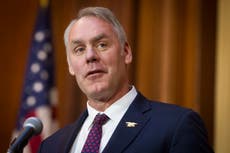Hillary Clinton mocks Trump ‘spying’ conspiracy: ‘The more his misdeeds are exposed, the more they lie’
‘Trump and Fox are desperately spinning up a fake scandal to distract from his real ones’
Hillary Clinton has mocked former President Donald Trump for claiming that her aides spied on him.
“Trump and Fox are desperately spinning up a fake scandal to distract from his real ones,” Ms Clinton tweeted on Wednesday. “So it's a day that ends in Y. The more his misdeeds are exposed, the more they lie.”
The latest filing from special counsel John Durham in his investigation into the origins of the Trump-Russia probe has been seized on by the conservative media and Mr Trump himself as vindication of the former president’s oft-repeated claims that he was “spied” on.
One headline said Mr Durham had alleged that the campaign of Ms Clinton paid to “infiltrate” servers at Trump Tower and the White House — though that verb is not used in the filing — and Mr Trump suggested that Democrats had been caught “illegally spying” in a scandal worse than Watergate.
Neither claim is exactly what Mr Durham alleged in a weekend filing that was ostensibly about a potential legal conflict-of-interest in the case. The filing detoured into the realm of internet traffic research and generated significant attention among followers of Mr Durham’s probe.
Mr Durham, the former US attorney in Connecticut, was appointed in 2019 by then-Attorney General William Barr to investigate possible misconduct within the government as it investigated Russian interference in the 2016 presidential election and any ties to the Trump campaign.
One of the three people he’s charged is Michael Sussmann, a prominent cybersecurity lawyer who represented the Clinton campaign during the 2016 election. In September of that year, he met with the FBI to relay concerns from cybersecurity researchers about a possible digital backchannel between servers of the Trump Organization and of Russia-based Alfa Bank — a tantalising claim that, if true, could have signalled contact between the Trump orbit and Russia at a time when the FBI was already trying to determine if there was such a connection.
The FBI investigated but found those concerns unfounded. Mr Durham charged Mr Sussmann last year with lying to the FBI during that 2016 meeting by saying that he wasn’t sharing the Alfa Bank concerns on behalf of any particular client when actually, prosecutors allege, he was doing so as an attorney for the Clinton campaign. Mr Sussmann’s lawyers have vigorously denied that he lied.
On Friday night, Mr Durham’s team submitted a filing raising the prospect of a conflict of interest because the law firm representing Mr Sussmann has had other clients in the Durham probe. Mr Sussmann’s lawyers responded Monday night by saying he would waive any potential conflict.
But they also struck back over the Durham team’s inclusion in the filing of allegations they said were false and “intended to further politicise this case, inflame media coverage, and taint the jury pool”. They said it was part of a pattern beginning with the September indictment of Mr Sussmann.
“The Indictment is 27 pages long and reads as though there was a vast conspiracy, involving the Clinton Campaign and Mr Sussmann, to defraud the FBI into investigating Donald Trump as part of an ‘October surprise,’” Mr Sussmann’s lawyers said. “But the Indictment does not charge anyone other than Mr Sussmann; the Indictment does not charge a conspiracy; and the Indictment does not even charge a fraud.”
In the filing, Mr Durham says Mr Sussman in February 2017 presented officials at a government agency — the CIA — with information derived from internet traffic that Mr Sussmann said showed that “Trump and/or his associates were using supposedly rare, Russian-made wireless phones in the vicinity of the White House and other locations”.
The Durham team said it has identified no support for those allegations, and said the “purportedly suspicious” data Mr Sussmann was drawing from actually showed that internet traffic involving the Executive Office of the President and the Russian phone provider had begun at least as early as 2014 — when Barack Obama was in the White House.
The court filing says Mr Sussmann relied on data gathered by a technology executive he worked with whose company, according to Durham, helped maintain servers for the White House.
The executive, Rodney Joffe, enlisted the help of computer researchers who were already analysing large amounts of internet data through a federal government cybersecurity research contract, tasking them with mining information to establish an “inference” tying Trump to Russia, the court filing says. The researchers exploited domain name system internet traffic at locations including Trump Tower, Mr Trump’s Central Park West apartment building and the Executive Office of the President, or EOP, Mr Durham said.
The researchers were not “spying” on the Trump campaign in 2016 but were instead working at the request of federal officials to investigate Russian malware attacks that had targeted the US government and the White House, said Jody Westby, a lawyer for one of the research scientists involved, David Dagon of the Georgia Institute of Technology.
The Associated Press contributed to this report
Join our commenting forum
Join thought-provoking conversations, follow other Independent readers and see their replies
Comments


Bookmark popover
Removed from bookmarks